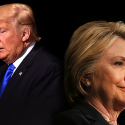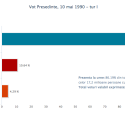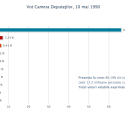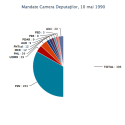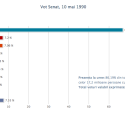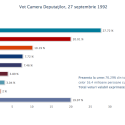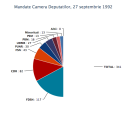Traian Basescu’s three interventions in the week that precedes Sunday’s general elections are relevant for the President’s transformation into the standard bearer of the ARD. In what is becoming a trade-mark electoral campaign intervention, the President lambasted the Government and the USL, while hinting that he remains the decisive actor in post-electoral period, regardless of the results. The President’s reluctance to nominate Victor Ponta for the position of Prime Minister is becoming the focus point of a renewed political crisis in Romania.
Traian Basescu declared that the reason that prompted his interventions is the attempt of the USL to involve him in the electoral campaign, as well as the statements of the USL leaders concerning the procedures concerning the nomination of the future prime minister. In spite of his previous statements and actions and in total disregard for the general political context, Traian Basescu insisted that he has tried to remain outside the scope of the political struggle and act as a neutral actor (although the imagery and the messages of the ARD are centered on his program and on his previous undertakings). In spite of his numerous attempts to influence political life and in spite of the Constitutional Court judgement that emphasized before this summer’s referendum his inability to act as a mediator between the state institutions and the Romanian society, Traian Basescu still insists that he remains a neutral actor forced to abandon this position by the deeds of the USL.
The only arguments in his defense are the electoral flyers, banners and internal political messages of the USL, which, according to Traian Basescu, stand as conclusive evidence of the USL’s attempt to make an electoral target out of him. The President deliberately ignores the fact that he personally announced the slashing of the public sector wages and pensions and that he was personally involved in drafting the austerity policies, thus deliberately usurping the prerogatives of the Prime Minister, as the Constitutional Court judges concluded this summer. The President also ignores the manner in which he has engineered himself several governing coalitions, outside the customs of the Romanian political scene.
The President has ended up as the main electoral agent of the ARD and his statements are reduced to commenting the electoral banners and the messages of the USL, due to the obvious inability of the ARD to act as a counterbalance to the USL’s legitimate political proposals.
Another prominent aspect of the President’s speech was the renewal of his slanderous attacks on the leaders of the USL. Traian Basescu referred once more to the Prime Minister as a compulsive liar and accused the leaders of the USL of electoral fraud during the referendum. In his second intervention this week, the President added that he is convinced that the USL leaders will attempt to fraud the elections.
It is important to note once again that as far as the investigations into the referendum vote are concerned, the number of irregularities registered by the officials (the Public Ministry, the Permanent Electoral Authority) is the lowest ever registered in Romania since the organization of free elections in 1990. Moreover, the President argued without advancing any piece of evidence that the leaders of the USL are responsible for an electoral fraud of 1.5 to 2 million votes.
It is important to note that not only the leaders of the USL were the targets of Traian Basescu’s derisive comments – PES leader Sergey Stanishev was another politician mentioned by the President. Traian Basescu declared that he knows Mr. Stanishev. The President added that all he can say is that he is aware of his performance as Prime Minister of Bulgaria and that he took note of Mr. Stanishev’s statement concerning the result of the electoral elections. Traian Basescu went on to make slanderous remarks against several USL politicians – he declared he will „not honour” former PM Calin Popescu-Tariceanu or Ioan Rus by nominating them for the position of Prime Minister. In regards to Victor Ponta, the President obsessively called him a „compulsive liar”.
The most important aspect of Traian Basescu’s speech remains nevertheless his insistence that the nomination of the future Prime Minister is his prerogative. The President added that the general elections have no influence whatsoever on the nomination he will make. The general elections, according to the President, determine the composition of the Legislature, not the future Prime Minister. The President added that after consultations with the political parties, he will make sure that he will nominate for the position of Prime Minister a politician capable of garnering a parliamentary majority, but that the results of the December 9 elections are inconsequential in regards to his decision.
THE POLLS CONFIRM THE USL’S LANDSLIDE VICTORY
According to a Public Affairs public opinion poll, conducted between 3-5 December, the USL stands to win at least 57.5% of the votes in Sunday’s general elections. The ARD (the alliance grouping the PDL and several parties comprising president Traian Basescu’s supporters) will receive only 18.65 of the votes. Populist PPDD is polled at 12.9%, whereas the UDMR, the party of the Hungarian minority is close to the 5% parliamentary threshold. According to the poll, Prime Minister Victor Ponta is the most popular politician, whereas 69.4% of those interviewed hold a negative view of Traian Basescu, the incumbent president.
The figures are similar in the latest CCSB public opinion poll, conducted between 3-5 December. The USL stands to win 59% of the votes, whereas the ARD will receive the support of only 16% of the Romanians. PPDD is polled at 10%, whereas the last political party that will be represented in the Parliament, the UDMR, garners 5% of the votes. According to the poll, voter turnout is placed at 46%.
VICTOR PONTA OP-ED PUBLISHED IN THE WASHINGTON POST
Prime Minister Victor Ponta argues in the latest op-ed published by The Washington Post that under the USL government, Romania has tried to find a steady balance between macroeconomic stability and the need to undertake measures to foster smart growth. Rejecting the unsound austerity policies, in much as the same manner in which voters in the US or France did, the USL admitted the need to overcome the ideological divide in times of massive social and economic hardness, by bringing together a center-right and a center-left party.
The measures undertaken insofar by the USL government, Victor Ponta showed, have managed to reduce the public deficit from 4.1% to 2.2% of the GDP, although several austerity measures, including the one pertaining to the slashing of public sector wages have been scaled back or eliminated. The op-ed goes on to show that the reforms brought to the tax reimbursement system, the low taxes and the decisive steps undertaken in order to tackle some of the heavily entrenched financial arrangements are the founding stones for fostering smart and inclusive growth.
Victor Ponta conclusively argues that prolonged austerity measures amidst the most serious financial crisis since the Great Depression not only lead to social strife and hardship, but are also incapable of redressing the economic situation. Achieving a balance between fiscal responsibility and inclusive and durable growth seems to be the only alternative on “both sides of the Atlantic” concludes the op-ed.
ROMANIA SET FOR THE FREEST AND FAIREST ELECTIONS
In spite of President Traian Basescu’s insistent statements that the upcoming December 9 general elections will be affected by widespread fraud, claims that haven’t been insofar backed by any piece of evidence, the USL government has taken steady measures to ensure that the electoral process will proceed transparently, ensuring the legitimacy of the election of the new parliament.
The Government has invited along the representatives of several high-profile Romanian NGO’s, with an adequate experience in observing elections, observers from the OSCE, in order to evaluate the fairness of the electoral process.
Moreover, the Government has adopted in a government session the Emergency Ordinance (No. 70/2012) that clearly specifies what acts are to be considered electoral bribery. In addition to that, the government has given an off day on Monday (10th December) for students, most of who travel home during the weekend and may not have a chance to vote. The Ministry of Foreign Affairs has also made significant efforts to ensure all those living abroad that are entitled to vote in the parliamentary elections can do so.


